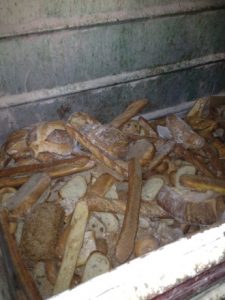
Kwak-Hefferan, Elisabeth. “Spoil Sport: How I Learned to Stop Worrying and Love the Dumpster.” Grist, 5 Nov. 2012, grist.org/food/spoil-sport-how-i-learned-to-stop-worrying-and-love-the-dumpster/.
For me the most interesting topic discussed this week was the TED talk about food waste. It tied in well with other course work we have read. For example, Stuart in the talk asked the audience how many of them did not eat the rind of the bread (most of them did not), then he showed a number of wasted rinds a bread factory produces per day, a much more significant amount. This reminded me of the Maniates paper on how it is the corporations who produce the most waste, not the consumer. Also, the fact Stuart mentioned that cows are an inefficient method of turning plant matter into meat corroborated the statistics on virtual water, where cows take over twice as much water per pound as sheep the next most expensive in terms of water.
So, what can be done about this problem? Since we are dealing with corporations it seems the simplest answer is to give them some financial incentive not to waste so much food. For instance, tax breaks for corporations if the waste products that are fit for human consumption like the bread rinds are donated to homeless shelters or food banks. This would make corporations think twice about throwing away edible food. Or we can continue the line of thinking that the speaker brought up and feed the waste to pigs and other animals that can successfully transform waste to food. In this way, we can cut down on the amount of food that goes to feed the animals as well as cut down on the waste involved in producing the food system.
However, these solutions could lead to the food that is currently being given to the hungry in America or being used for raising animals, to be exported instead as they are no longer needed at home. This could cause more of the same effects of subsidized food and food aid from America disrupting foreign markets. Thinking about this problem allowed me to appreciate how difficult it must be to predict how changes in one end of a food system will impact the rest of that system.
